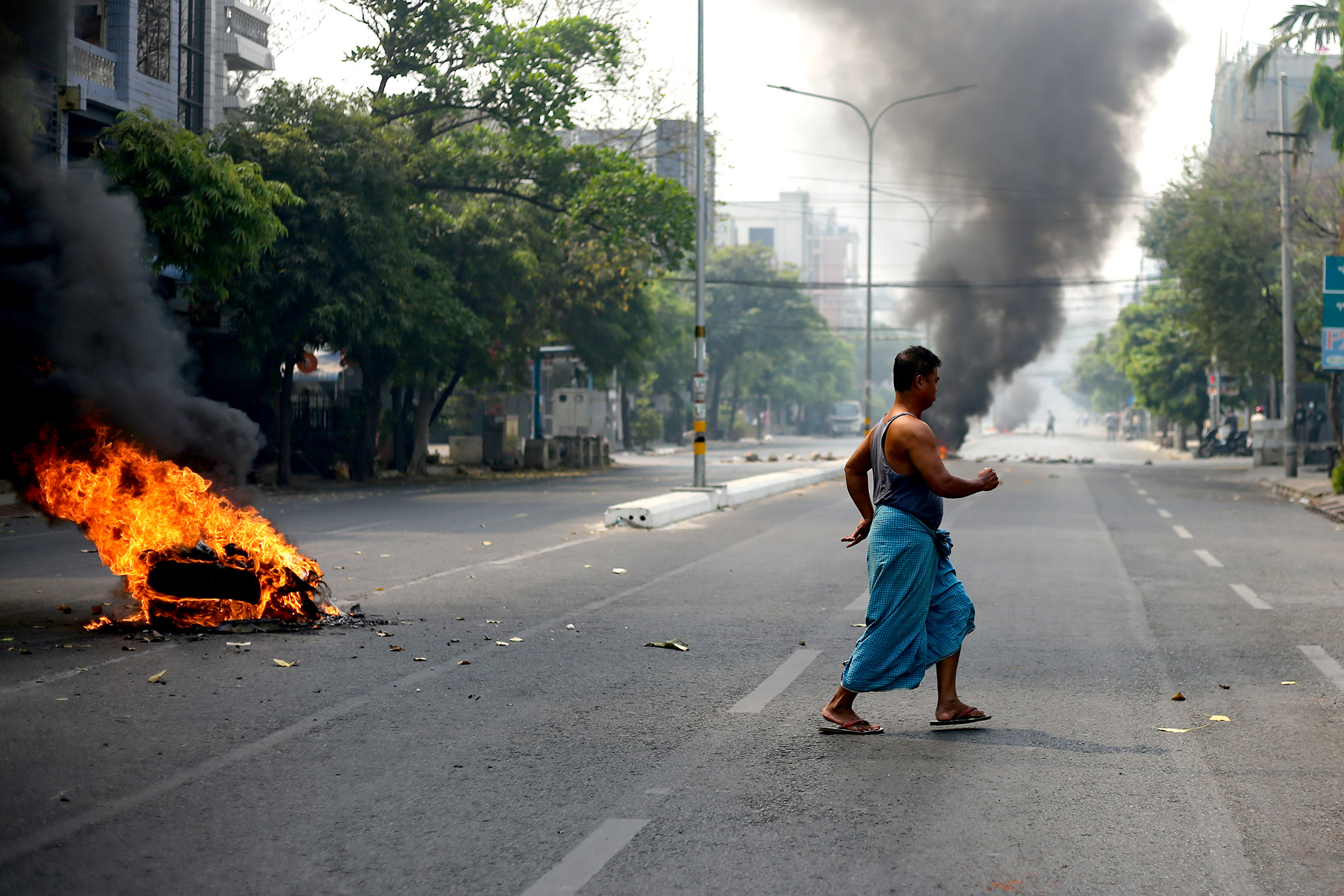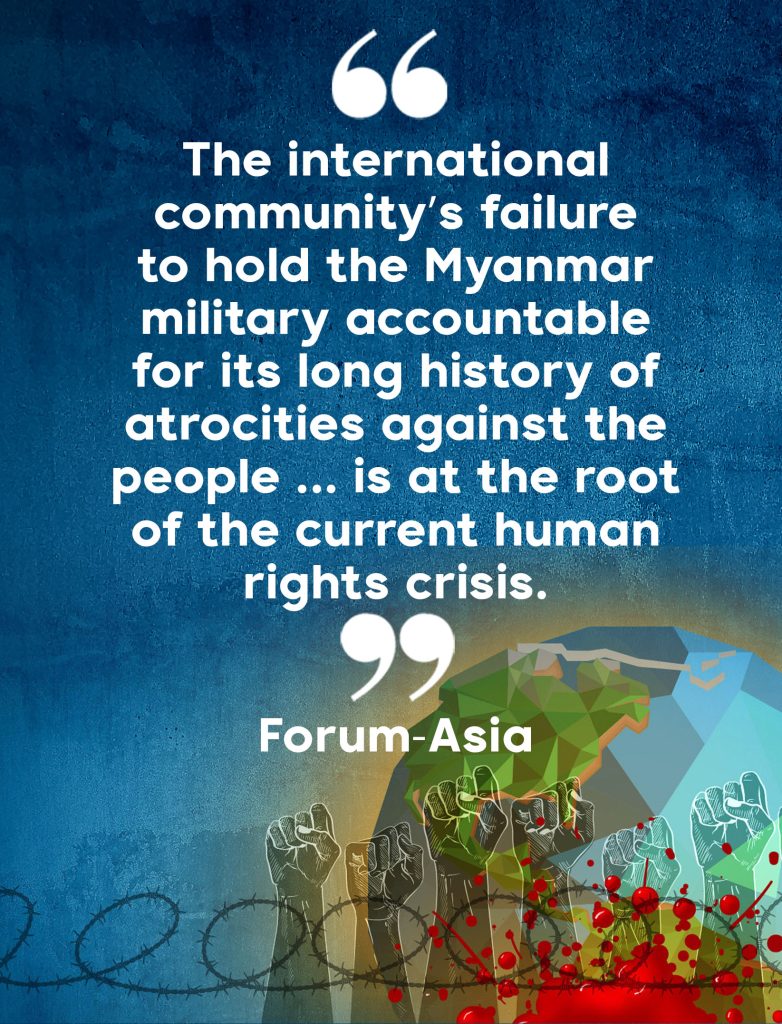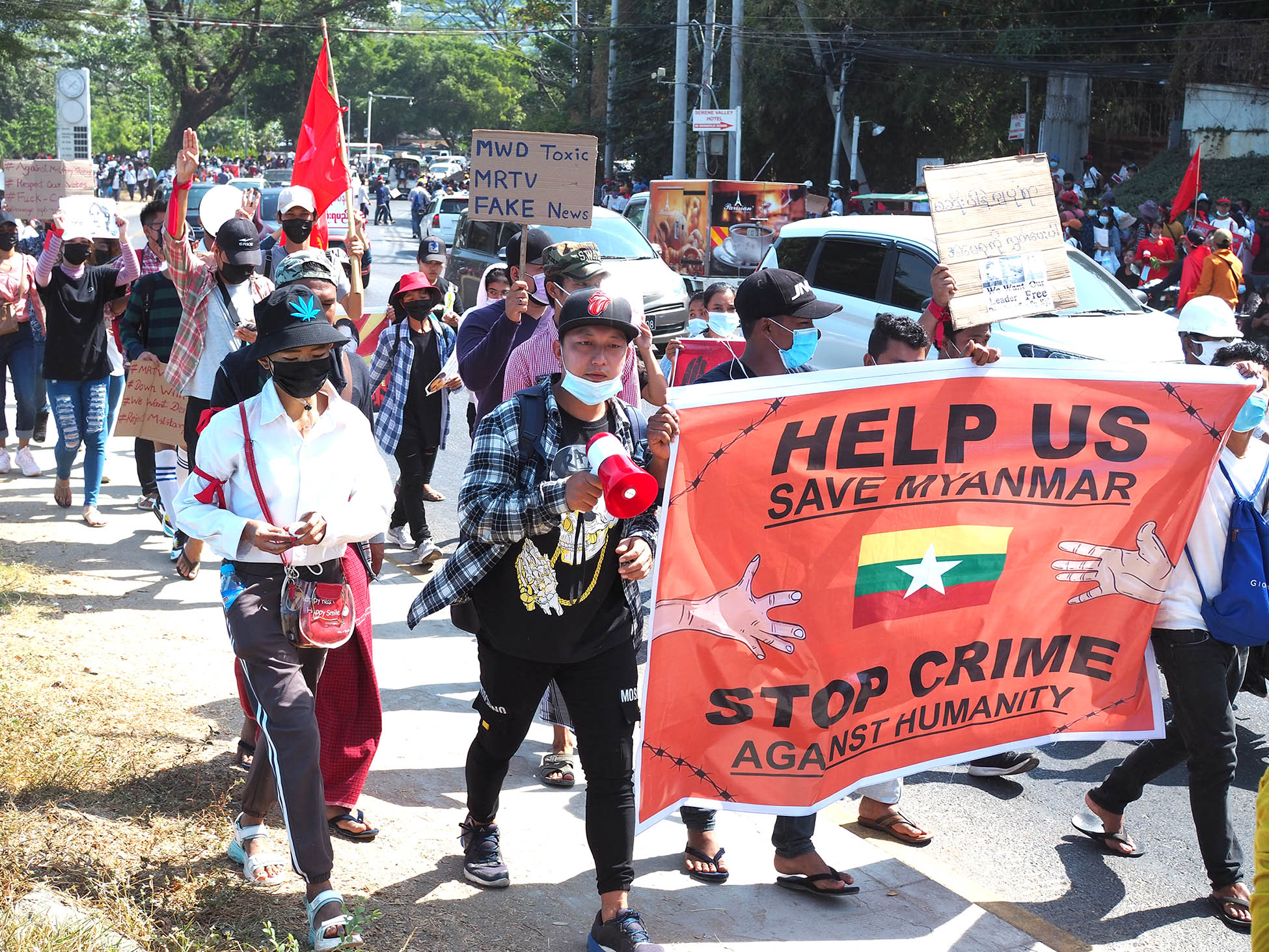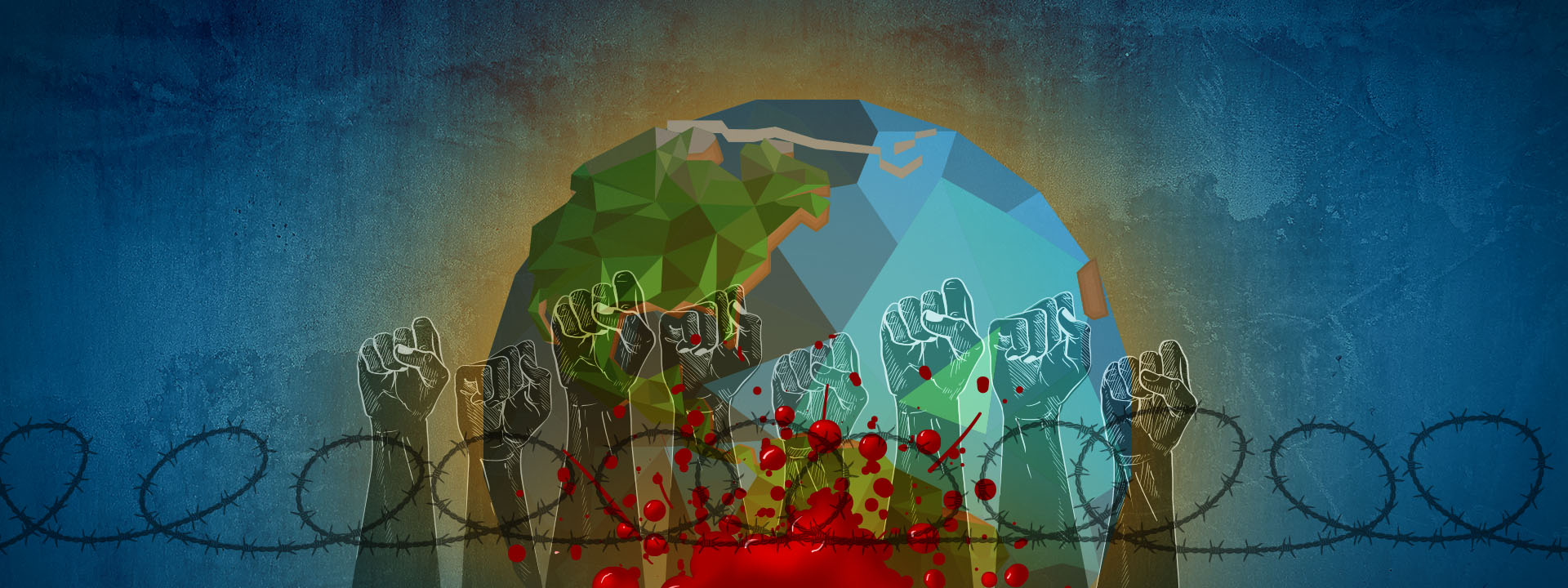Phoe Kaung says that he can still vividly remember Feb. 1, 2021 like it was only yesterday. “When I heard the news early in the morning that the military had staged a coup and detained leaders including Aung San Suu Kyi, it was surreal,” says the Yangon resident. “I looked outside my window but it seemed like the usual morning with people commuting. But the first thought I had since that day has stuck with me: ‘Our future is done for.’”
In the following months, Kaung says, he saw Myanmar’s democratic progress in the last decade go down the drain. “It’s utterly devastating to witness people losing their friends and loved ones to either the third wave of COVID-19 or killings by the junta,” he says. “You have to fear for your safety when going out as you can be arrested by the military.”
The Feb. 1, 2021 coup d’état saw the democratically elected members of the country’s ruling party, the National League for Democracy, deposed by the Tatmadaw, Myanmar’s military. On the coup’s first anniversary, junta chief Min Aung Hlaing announced that the military will be extending its state of emergency to another six months.
Rights activists say, though, that the international community should start acting now if it wants to see Myanmar again as a vibrant democratic state.

Fighting alone? Many of Myanmar’s neighboring countries seem slow to act, even in the face of atrocities experienced by the country’s citizens.
Ichal Supriadi, secretary-general of Asia Democracy Network (ADN), said in a recent phone interview: “Myanmar’s tragedy is one of the biggest political crises in Asia. It could be worse than Afghanistan.”
Referring to the Myanmar military, he added, “They are not only harming democratic values, but are also committing human rights violations.”
In a Jan. 31, 2022 online media forum organized by the alliance of organizations under the Asian Forum for Human Rights and Development (Forum-Asia), Myanmar activist Khin Ohmar, chairperson of Progressive Voice, noted that as of Jan. 28, 2022, 2,164 people —100 of whom were women and another 100 children — have been killed in military offensives in her country. More than 12,000 have been arrested, she reported, with 9,000 still in detention — mostly women and members of the lesbian, gay, bisexual, transgender and intersex (LGBTI) community, who are subjected to torture and sexual assault.
Omar said the Myanmar fatalities in the last four months have been greater in number than those who perished in the strife in Afghanistan, Iraq, and Syria.
“The junta is committing crimes against humanity and war crimes, the same as what the military did to the Rohingya in 2017,” she said.
Diplomacy, sanctions, and pressure
For Forum-Asia, the international community is partly to be blamed for the crisis. It said that the Feb. 1 coup was as much about ensuring the impunity of the military and its top brass as maintaining its power over society and safeguarding its economic interests.
“The international community’s failure to hold the Myanmar military accountable for its long history of atrocities against the people, including genocide, crimes against humanity, and war crimes, is at the root of the current human rights crisis,” said Forum-Asia in response to emailed questions.
It said that the international community had even “celebrated cosmetic changes introduced by the military” since 2011 and the 2015 general elections as Myanmar’s transition to democracy. This “allowed the military to entrench its power in all areas of Myanmar society without scrutiny and civilian oversight,” the organization said.
Tharindu Abeyrathna, program officer of the Asia Network for Free Elections (ANFREL), agreed that “the coup was in equal parts politically and financially motivated” as the economic interests of the military play a huge role in the current situation. He said that the international community should therefore “cut funding to the Myanmar military through coordinated and targeted economic sanctions.”
“The UN Security Council must impose a global arms embargo to cut weapons flows,” said Abeyrathna, noting the killings by the military in Myanmar’s ethnic and majority areas. “The recent junta air raids and heavy weaponry attacks in Sagaing, Chin, Kachin, Kayah, and Kayin show the scale of damage that can be caused by the junta to the civilian population.”

Meanwhile, Phil Robertson, deputy Asia director of Human Rights Watch (HRW), said that pressure and effective targeted sanctions need to be focused on the junta’s sources of oil and gas revenues and access to sophisticated military arms. He added that this must involve “concerted pressure to get other governments like Ukraine, India, Pakistan, China, and Russia to stop selling arms to the Myanmar military.”
According to ANFREL, rights groups have also been demanding that multinationals such as Chevron, Total, Kirin, and Woodside cut off their ties with businesses identified with the Tatmadaw and its officers. Forum-Asia identified Myanmar Oil and Gas Enterprise among the Myanmar corporations that should be sanctioned, adding that individual states should ensure that their activities do not benefit the junta.
Putting pressure and imposing sanctions notwithstanding, ADN’s Supriadi suggested the use of full diplomacy, consultation, and creating new approaches to the bumpy path to creating peace in Myanmar. He lamented that the Association of Southeast Asian Nations (ASEAN) has already laid all its cards on the table.
“I’m worried that all mechanisms have been exhausted,” Supriadi said. “The ASEAN is not designed to talk peace and security; the split among member countries on the issue is obvious.”
Birds of a feather
Indeed, ANFREL’s Abeyrathna remarked, “The crisis in Myanmar also shows how dictators stand together.” He singled out Cambodian Prime Minister Hun Sen, who recently visited Myanmar as ASEAN chair, a move legitimizing the coup leaders there, and Thailand, which has had a rather supportive approach to Myanmar since the coup.
He observed, however, that reactions from Asian countries and Myanmar’s neighbors India and China have been as disappointing as ASEAN’s. “When the U.S., U.K., and Canada imposed sanctions against the junta and its economic affiliations, Singapore, South Korea, India, and Japan continued to engage with military-connected companies,” he said.
Singapore, the largest single investor in Myanmar, could play a more active and effective role in pressuring the junta than just issuing statements, Abeyrathna said.
HRW’s Robertson said that it is important for people’s movements around the region who are struggling with their own abusive governments to recognize that they have a huge stake in the success of the people’s revolution against the military coup in Myanmar.
“If the coup-makers in Myanmar succeed,” he said, “this will send a very problematic signal to other countries that military seizures of power are okay, and that dictators trampling on the rights of the people is an effective tactic.”
Supriadi had a similar view, saying that the one dominant lesson from Myanmar is that “democracy can be harmed anytime by an undemocratic power such as military or armed groups.” He said that damage can happen again to fragile democracies such as Indonesia and the Philippines, which is also about to embark on another round of national elections this May.
“Individuals and groups with resources can use power to manipulate elections,” said Supriadi, “so people must ensure that elections will result in a better direction for their countries.”
Then again, ensuring democracy requires more than periodic elections, said Forum-Asia. “Free, fair, and inclusive elections should go hand in hand with establishing and consolidating independent and credible judicial systems and other independent institutions to ensure protection and promotion of human rights,” it said.
The organization also said Myanmar and other states in the region such as Thailand, which has witnessed multiple military takeovers of elected governments, demonstrate the need for robust and effective civilian oversight of and control over military and security forces.
ANFREL’s Abeyrathna, for his part, pointed to the “long-term negative effects of the militarization of government institutions” and providing economic independence to the military, even as he stressed the importance of independent institutions such as the judiciary.
The people push back
Robertson, though, said that Min Aung Hlaing and his fellow coup-makers may have underestimated the people of Myanmar, and had not expected such deep, widespread resistance to their coup.
It is now a tug of war between the military and the people, he said, with soldiers and police using excessive and lethal force to coerce people into subservience, and the peaceful Civil Disobedience Movement (CDM) protesters with their mass strike and economic boycotts, making the economy and country ungovernable. Added to this is the growing presence and role of the People’s Defense Force militias.

Myanmar citizens, some seen here in one of the early peaceful protests in February 2021, are appealing to the international community to help their country.
“The situation has become a battle royale for the control of the country,” Robertson said. “At this point, it’s hard to say which side will prevail, but what is certain is there will be increased tit-for-tat violence, more massacres committed by the military as we saw on Christmas Eve in Karenni state, and more human rights violations.”
Nevertheless, Robertson lauded the bravery of the people of Myanmar, which he described as impressive — standing up against the power grab and pushing through repeatedly with their mass protests to say that the illegal seizure of power will not stand, despite all kinds of threats.
He cited in particular the country’s youth who grew up between 2010 and 2020 and experienced civil and political freedoms. Growing in economic prosperity, they had not been prepared to give those up for the sake of a few military generals’ interests, Robertson said.
Yangon resident Phoe Kaung says that Myanmar’s citizens may fear reprisal when they speak up, but they do raise their voices. He says, “Many people are still opposing the junta vocally on social media, and through flash mob strikes and silent strikes, which we also saw during the coup anniversary.”
“The daily CDM mass strikes show the power of a united people,” agreed Robertson. He added, however, “The lesson being learned every day is one that the Burmese people increasingly take to heart: That having democracy without having real human rights protections is not sustainable.” ●
Diana G. Mendoza is a freelance journalist based in Manila.



















